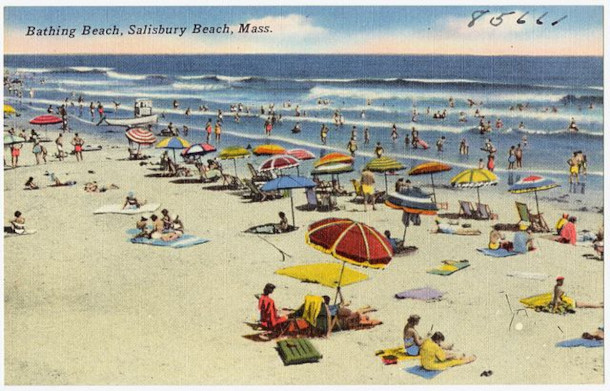Beyond the Headlines
Air Date: Week of March 22, 2024

Lead exposure can lead to harmful health effects including neurological issues. A recent study found that individuals currently receiving federal housing assistance in the United States had blood lead levels that were 11.4% lower than those of other low-income individuals. (Photo: National Cancer Institute, Unsplash)
This week, Living on Earth Contributor Peter Dykstra and Host Aynsley O’Neill talk about a study that found safer lead levels in people living in federal public housing versus low-income private housing. Also, a $600,000 sand dune paid for by residents of Salisbury, MA washed away just days after being put in place. And in history they celebrate the birthday of French mathematician Jean Baptiste Joseph Fourier, who first proposed the existence of the greenhouse effect 200 years ago.
Transcript
O'NEILL: It's the time in our broadcast where we want to take a look at some stories from beyond the headlines. And for that we need Living on Earth contributor Peter Dykstra. He's on line now from Atlanta, Georgia. Hey there, Peter, what do you have for us this week?
DYKSTRA: Oh, hi, Aynsley. There's a study in the journal Environmental Health Perspectives that brings us some good news in an area we really don't expect it. Blood lead levels for residents in federal housing were 11% lower in a recent study than those of other low income residents living in private housing. The reason for this is that federal housing has taken strong action to reduce lead paint. And it's shown positive results. And of course, lead is a huge problem, because it impacts neurological systems, particularly those of young kids.
O'NEILL: I feel like there's always something going wrong when we talk about government housing programs. So it's nice to hear some good news for once.
DYKSTRA: It is, and there's still plenty going wrong with government housing and housing in general. But this is good news, particularly in low income housing that tends to have a bias toward people of color.
O'NEILL: Hopefully, the government can take a page out of their own book when it comes to regulating private landlords and housing companies and get some progress on lead exposure in those homes as well.
DYKSTRA: Right and it may take government action there because slumlords are rarely inspired to do the right thing on their own.
O'NEILL: Sadly, all too true. Well, what else do you have for us this week, Peter?

Salisbury beach in Massachusetts, long a popular destination for beachgoers, is now threatened by rising sea levels. Residents spent about $600,000 on sand to protect the beach in early 2024, only to have the protective dune wash away in a winter storm days after it was completed. (Image: Boston Public Library Tichnor Brothers collection, Wikimedia Commons, Public Domain)
DYKSTRA: We go from some good news in low income housing to some potentially bad news for high income housing, specifically Salisbury, Massachusetts. That's a town north of Boston with a beautiful stretch of beach. That beach is lined with million dollar homes, and they have a beach problem. Not the usual beach problems we hear about from spring breakers or sharks, but it's the beach itself, which is washing away. That's what barrier beaches do. But with sea level rise, it's happening quicker and these million dollar homes are threatened.
O'NEILL: Well barrier beaches, if they're always washing away, what's the news story here, Peter?
DYKSTRA: The residents looking at the beach disappearing, having coped with storms, are now looking at more frequent storms from climate change. They're looking at sea level rise. And so private homeowners trucked in $600,000 worth of sand to protect their eroding beach. And that sand, expected to last at least a few years, was gone in a single weekend storm.
O'NEILL: Wow, that is a lot of sand and a lot of money lost in one storm. What else can they do, Peter?
DYKSTRA: Well, when you have million dollar homes, and the beach is gone, you no longer have a million dollar beach home. It's something that has no real solution. A lot of our sandy beaches are disappearing or are going to disappear. Climate change is making that just a quicker phenomenon.
O'NEILL: Well, Peter, before we let you go, it's time for you to tell us what happened in history this week.

The French mathematician Jean-Baptiste Joseph Fourier (b. March 21, 1768) studied heat flow and is often considered the first scientist to describe what we now know as the greenhouse effect, though he didn’t name it that. (Image: Artist Julien-Léopold Boilly (1796–1874), Wikimedia Commons, Public Domain)
DYKSTRA: Certainly. On March 21, 1768, a mathematician and physicist named Jean-Baptiste Joseph Fourier was born in France. In the early 19th century, specifically 1824, 200 years ago, he authored the first of two papers that looked into the possible origins of the greenhouse effect, because he wondered why the Earth, some 93 million miles on average away from the Sun, stayed so warm and how the planet's atmosphere trapped solar heat.
O'NEILL: Two centuries and we've been building off that knowledge ever since. Happy birthday to Jean-Baptiste Fourier.
DYKSTRA: Happy birthday indeed.
O’NEILL: Well, Peter, thanks as always for taking us beyond the headlines. Peter Dykstra is a contributor to Living on Earth and we'll talk to you again soon.
DYKSTRA: All right, Aynsley, thanks a lot and we'll talk to you soon.
O'NEILL: And there's more on these stories on our website. That's LoE.org.
Links
Read the study about federal housing and blood lead levels here
WBUR | “Salisbury, Mass. Spent $600K on Shore Protection. A Winter Storm Washed It Away Days Later”
Living on Earth wants to hear from you!
Living on Earth
62 Calef Highway, Suite 212
Lee, NH 03861
Telephone: 617-287-4121
E-mail: comments@loe.org
Newsletter [Click here]
Donate to Living on Earth!
Living on Earth is an independent media program and relies entirely on contributions from listeners and institutions supporting public service. Please donate now to preserve an independent environmental voice.
NewsletterLiving on Earth offers a weekly delivery of the show's rundown to your mailbox. Sign up for our newsletter today!
 Sailors For The Sea: Be the change you want to sea.
Sailors For The Sea: Be the change you want to sea.
 The Grantham Foundation for the Protection of the Environment: Committed to protecting and improving the health of the global environment.
The Grantham Foundation for the Protection of the Environment: Committed to protecting and improving the health of the global environment.
 Contribute to Living on Earth and receive, as our gift to you, an archival print of one of Mark Seth Lender's extraordinary wildlife photographs. Follow the link to see Mark's current collection of photographs.
Contribute to Living on Earth and receive, as our gift to you, an archival print of one of Mark Seth Lender's extraordinary wildlife photographs. Follow the link to see Mark's current collection of photographs.
 Buy a signed copy of Mark Seth Lender's book Smeagull the Seagull & support Living on Earth
Buy a signed copy of Mark Seth Lender's book Smeagull the Seagull & support Living on Earth

